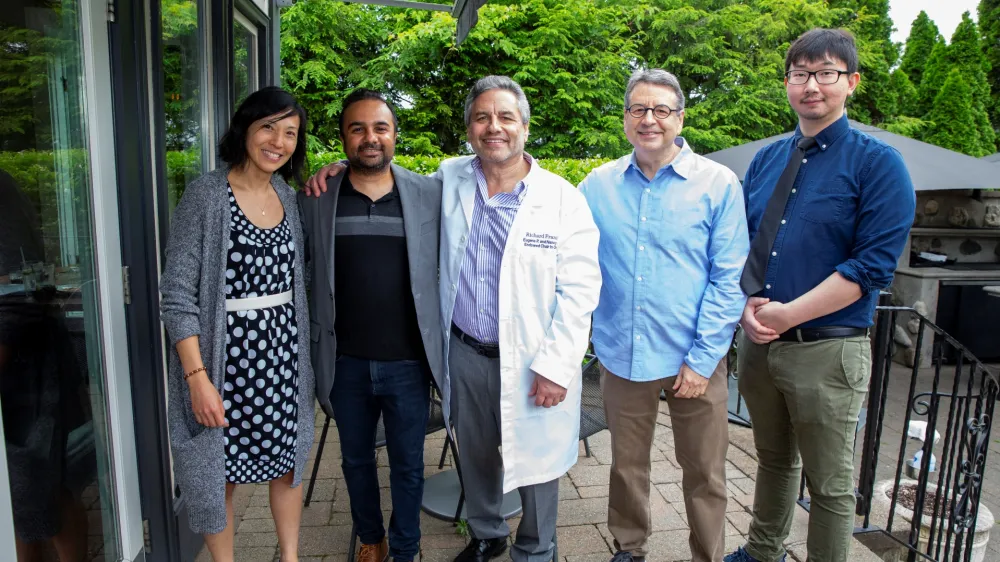Providing your location allows us to show you nearby locations and doctors.
Study shows pancreatic cancer screenings may benefit people with diabetes

06/25/2025
Nuvance Health researchers published original, first-of-its-kind study results showing early detection of pancreatic cancer may be possible in high-risk individuals.
In a major step toward improving survival for one of the deadliest cancers, researchers at Nuvance Health, now part of Northwell Health, have published original research showing people with certain types of diabetes may benefit from pancreatic cancer screenings.
Nuvance Health researchers published pancreatic cancer study results in a peer-reviewed medical journal
Published in the Journal of Clinical Endocrinology and Metabolism, PANDOME is the first reported prospective pancreatic cancer screening study of its kind. Researchers enrolled individuals aged 50 and older with new-onset diabetes (NOD) or deteriorating diabetes (DD). Participants had MRI screenings of their pancreas to monitor for an underlying pancreatic cancer that had not yet caused typical symptoms of abdominal pain, jaundice and weight loss. Early results from the study demonstrate screening this high-risk population may help detect pancreatic cancer at an earlier, potentially curable stage.
Richard Frank, MD, the Nancy J. and Eugene P. Beard Endowed Chair in Cancer Research at Nuvance Health, leads the study. He said:
“These early results confirm our hypothesis that there is a link between diabetes and pancreatic cancer. While these results are encouraging, we are in the preliminary stages of research and cannot yet recommend screenings for people with diabetes.”
Dr. Frank continued: “We will continue the study with the aim of validating our findings and ultimately developing new guidelines for which individuals with diabetes should have pancreatic cancer screening.”
Learn more about the pancreatic cancer screening study.
New-onset or worsening diabetes after age 50 may be an early warning sign of pancreatic cancer
Pancreatic cancer has a five-year survival rate of 13% because 85% of cases are found too late for surgical removal. Pancreatic cancer outcomes are dismal compared to a 91% five-year survival rate for breast cancer, which can be detected early through mammography.
Pancreatic cancer symptoms usually do not appear until the disease is already advanced. If it is found early and removed surgically, the five-year survival rate is nearly 50%.
“Clearly, if we can catch pancreatic cancer earlier, we can improve outcomes,” said Dr. Frank, who is also a medical oncologist at Northwell Health’s Norwalk Hospital and the system chief of clinical and translational cancer research for Nuvance Health. “But, not knowing who to screen is the main problem with screening for pancreatic cancer. The cancer is not common enough to test the general population, as we do for breast and colorectal cancers.”
Hereditary pancreatic cancer screening has focused on individuals with a strong family history or genetic mutation, such as BRCA2. But these groups represent fewer than 10% of pancreatic cancer cases. The PANDOME study focuses on diabetes, which is a far more common condition.
“Diabetes is very common and pancreatic cancer is not. It is important to highlight that 99.5% of individuals with new-onset diabetes will not have pancreatic cancer. Our preliminary findings support the work of other researchers that when new-onset or deteriorating diabetes are associated with weight loss in older individuals, the risk of pancreatic cancer increases,” Dr. Frank said.
“This is a seminal moment in cancer research,” said John M. Murphy, MD, president and CEO of Nuvance Health. “Dr. Frank and the research team have passionately pursued this study, determined to find a way to screen for pancreatic cancer and save lives. Thanks to Dr. Frank’s vision, we now have evidence it is possible to detect pancreatic cancer earlier. This could transform how we approach screening for this devastating disease.”
Real people, real impact: Early detection of pancreatic cancer may save lives
The PANDOME study is being conducted by dedicated doctors, nurses and researchers at Norwalk Hospital and the Rudy L. Ruggles Biomedical Research Institute. This groundbreaking study is made possible by generous donors and is 100% supported by philanthropy.
The study is also supported by important referring physicians, such as endocrinologists, who connect their patients with the study.
Watch a video about a study participant who survived early-stage pancreatic cancer.
Photo: Some of the members of the PANDOME study team, including (left to right): Tammy Lo, APRN; Deep Pandya, MS; Richard Frank, MD; Thorsten Krebs, MD; Dugho Jin, DO